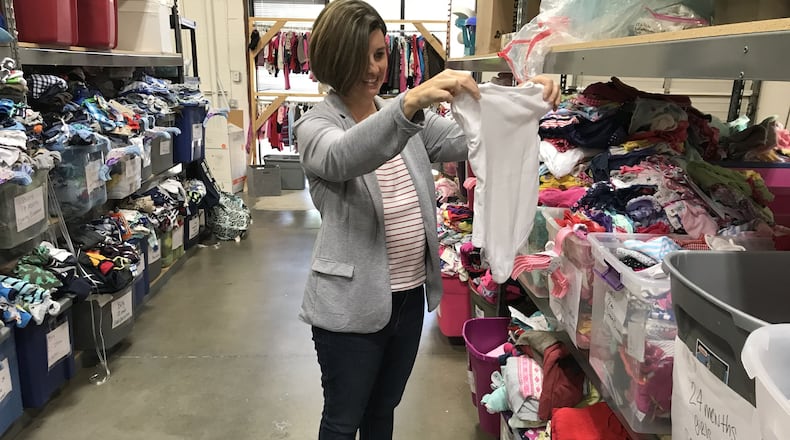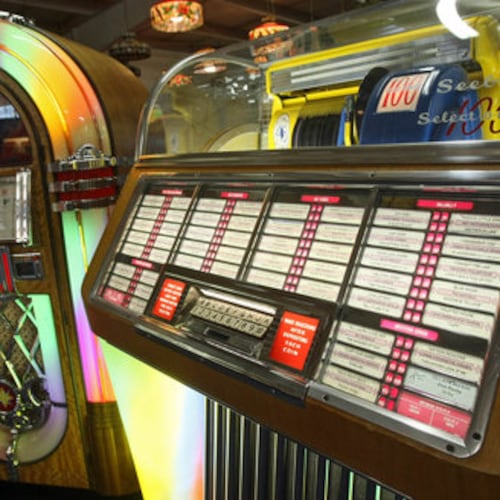After nearly 15 years of helping protect children and supporting their families, Jamie Lackey had seen some things: moms using plastic grocery bags as diapers, washing disposable diapers and reusing them, returning them so they can pay for gas to get t0 work.
That might be hard to imagine happening in a country as rich as ours, but it happens every day, in communities all over the USA.
“This is not an isolated thing,” Lackey assured me recently.
Lackey is the CEO and co-founder of Helping Mamas, a Norcross-based nonprofit that collects and distributes essential items for children up to age 12.
When she began this work in 2014, she was a social worker and mother of two small children, a job she was passionate about and loved.
She had a supportive husband, two incomes and friends and family who had her back.
And yet, Lackey said, being a mom “was the hardest job” she ever had.
Her own experiences made her realize how difficult it must have been for moms who didn’t have similar support.
“If it was hard for me, how much harder would it be without that support?” she asked.
Actually, it was pretty hard.
RELATED | Open arms, full house
For the vast majority of us, buying food, clothing and clean diapers is no big deal. For low-income parents, however, shelling out $70 to $80 a month for the eight to 12 diapers their infant or toddler needs each day can stretch the family budget to the breaking point. They don’t have rainy day funds, many don’t have health insurance, and they sure don’t have money for baby items.
Lackey saw that for herself.
Every day, she and her colleagues spent up to 30 minutes a day searching for resources, time that would’ve been better spent providing parenting education or job training for clients.
“We always say kids can’t go to school and learn if they are hungry,” Lackey said. “Well, parents can’t learn and focus on the skills they need to move to self-sufficiency if they are worried about their child’s basic needs.”
Lackey wanted to do something. There was plenty of baby gear at her home that wasn’t being used. If she gave it to someone who needed it, she could help a mom and free up time for social workers to do their jobs.
A Google search proved there were no coordinated efforts to provide baby essentials to needy families. Lackey applied for nonprofit status, and a friend’s mother-in-law opened her home to host a launch party.
There she did a PowerPoint that included pictures of friends and family with their children, hoping they’d see themselves in the lives of the poor families she served. She reminded them that they wanted their children to be happy, healthy, loved and successful. Regardless of their background, all moms wanted the same things.
It worked.
RELATED | Kids in Syria need diapers too; metro Atlanta woman wants to help
Women signed up that day to host drives to donate and help collect supplies, and to introduce Helping Mamas to their friends and family who might help as well.
Word of the nonprofit’s efforts began spreading like wildfire.
“I was working and wanted it to be a passion project I did in my free time,” Lackey said. “My husband and I decided, either we stop or go all in.”
They decided to take a “leap of faith” and, in 2016, Lackey quit her job to run Helping Mamas full time.
Today, the nonprofit serves over 15,000 children a year and has donated over a million basic essentials to women and children in need.
“A lot of people don’t know 1 in 3 moms have had to choose between buying food and diapers for their children,” Lackey said. “Without diapers, kids can’t go to child care; without child care, parents can’t work.”
It seems unimaginable, doesn’t it?
Listening to Lackey talk about moms struggling to pay for something as essential as a baby’s diaper, it’s hard not to just weep.
I’ve struggled with a lot in my years, but buying diapers just so I could drop my daughters off at day care was never one of them.
RELATED | If school is out, hungry children need our help
I asked Lackey why moms didn’t just buy cloth diapers so they could reuse them.
Her answer was simple and complex: health and sanitary issues.
Credit: The Atlanta Journal-Constitution
Credit: The Atlanta Journal-Constitution
“You can’t dispose of them and they can’t wash them on-site at day care centers,” she said. “Plus a lot of the families we serve are in shelters and don’t have access to washers and dryers.”
See the complexities?
It’s why Lackey is using the success of her diaper bank to create a broader dialogue on poverty and not just here in Georgia.
And so in addition to providing diapers, clothing and other essentials, Helping Mamas provides safe sleep education and car seat safety and is partnering with other agencies to reduce sudden infant death syndrome and infant mortality rates.
“We literally do everything,” she said.
No kidding.
Recently Lackey was in Washington, D.C., hoping to persuade members of Congress to support HR 1846, the End Diaper Need Act, which would create a $100 million demonstration project to distribute free diapers and diapering products to help reduce the need for diapers in low-income families and underserved communities.
If you think that’s for some Third World country, you’d be wrong.
Find Gracie on Facebook (www.facebook.com/graciestaplesajc/) and Twitter (@GStaples_AJC) or email her at gstaples@ajc.com.
HOW TO GIVE OR RECEIVE HELP
To make a donation to Helping Mamas or for assistance, log onto helpingmamas.org.
About the Author
Keep Reading
The Latest
Featured






